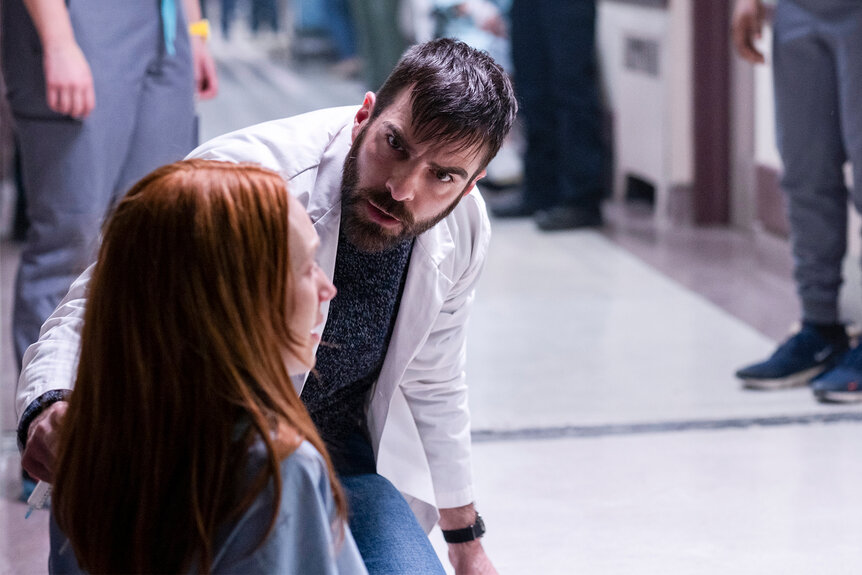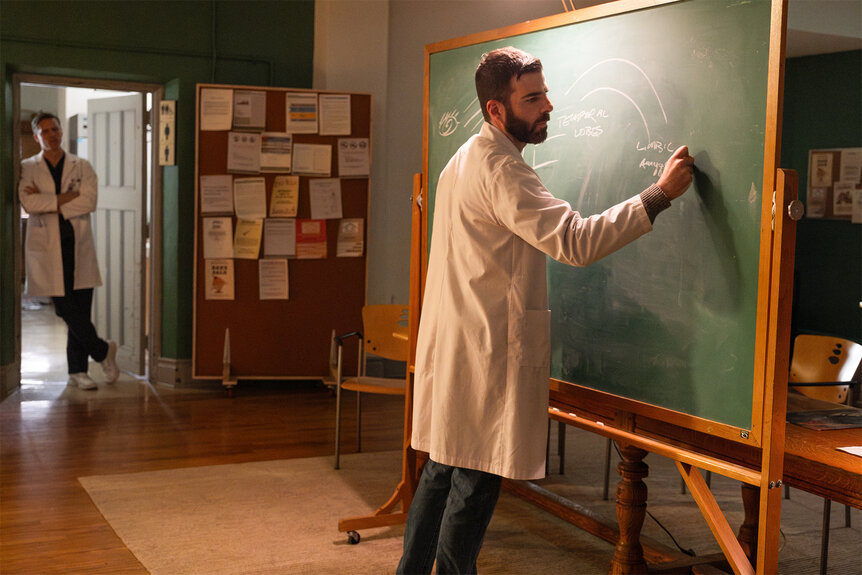A Brilliant Minds Medical Mystery: Capgras Syndrome Explained
Dr. Oliver Wolf's first big case at Bronx General is an emotional medical mystery.

Dr. Oliver Wolf (Zachary Quinto) believes you can’t treat a patient without understanding who they really are, and that sometimes the only course of treatment is breaking the rules. That philosophy explains why the pilot episode of Brilliant Minds begins with Dr. Wolf sneaking a patient out of the hospital under cover of darkness.
RELATED: Understanding Face Blindness: Seeing Through the Eyes of Brilliant Minds' Dr. Wolf
It’s a beautiful moment characteristic of Dr. Wolf’s medical philosophy, and he gets fired for the favor. Brilliant Minds, however, never remains still for long and Dr. Wolf soon has a new gig and a team of interns (whether he wants them or not) at Bronx General. That’s where he meets Hannah Peters, a mother who, after an operation to lessen her frequent seizures, no longer recognizes her children.
Rather, she recognizes them but thinks they are imposters, “lookalikes” who have replaced her actual children. She's diagnosed with Capgras Syndrome, and while the episode does a great job of explaining the medical mystery at hand, we here at NBC Insider wanted to take a deeper look into that mystery.
Understanding Capgras Syndrome – aka the Delusion of Doubles
The belief that loved ones have been replaced by “doubles” is the characteristic symptom of Capgras Syndrome, also known as the "delusion of doubles." It’s the most common (though still rare) delusional misidentification disorder and is characterized by the belief that a person or people close to you have been replaced by imposters. The disorder sometimes also extends to animals or objects. A person might, for instance, think that their pet or even their home is somehow false.
We see that play out in the episode when Dr. Wolf takes Hannah to her childhood home and she thinks it’s fake, too. For reasons that aren’t wholly understood, “doubles” are seemingly limited to people or objects with which the patient has a strong emotional bond.
RELATED: Zachary Quinto Reveals Brilliant Minds' Connections to Heroes and Star Trek
Capgras can be caused by damage to the bifrontal, right limbic, and temporal regions of the brain. It’s also seen in patients with Alzheimer’s, dementia, epilepsy, tumors, Parkinson’s, and more, as well as psychiatric disorders like Schizophrenia. Damage or disease causes problems with memory and the perception of reality. More specifically, it disrupts a person’s ability to integrate facial recognition and emotional information.
Put simply, patients with Capgras can recognize the faces of their loved ones, but they can’t connect with them emotionally and have a sensation that something is wrong.
The condition is rare, making it difficult to study, but Hannah’s case is relatively typical. She has normal emotional reactions when she thinks about her children, recalls past memories, or hears their voices without seeing them. Dr. Wolf confirms this phenomenon with a couple of experiments. In one, he plays a home video that elicits no emotional response until he hides the screen. In another, he blindfolds Hannah and has her talk with her children. In both cases, Hannah built and maintained ordinary emotional relationships as long as she wasn’t looking at the people or places she cared about.
Wolf describes the brain as a series of roads that signals have to successfully navigate. And in Hannah’s case, it turned out the surgery performed by Dr. Josh Nichols (Teddy Sears) damaged the road between vision and emotion — but there are other roads. Patients with Capgras have to lean on auditory signals to help them maintain connections. Treatments usually include a combination of medication, therapy, and increased auditory communication to circumvent the troublesome visual component.
Often, Capgras appears alongside some other mental illness and may subside when the underlying condition is treated. Sometimes it’s more permanent. There may not be a "solution" in the traditional sense, but patients can learn new neural pathways and carve new pathways through the world.
As Dr. Wolf says, quoting William Osler, “Ask not what disease the person has, but rather what person the disease has.”
New episodes of Brilliant Minds premiere on Mondays on NBC at 10/9c and are available to stream on Peacock.

















